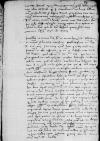Redditae sunt mihi cf. Iustus Lodvicus DECIUS (DECJUSZ, DIETZ) to Ioannes DANTISCUS Cracow, 1536-01-12, CIDTC IDL 1400⌊litteraecf. Iustus Lodvicus DECIUS (DECJUSZ, DIETZ) to Ioannes DANTISCUS Cracow, 1536-01-12, CIDTC IDL 1400⌋ Dominationis Vestrae 1536-01-12⌊XII Ianuarii1536-01-12⌋ Cracow (Kraków, Cracovia), city in southern Poland, Małopolska, on the Vistula river, from 1038 capital of the Kingdom of Poland⌊CracoviaeCracow (Kraków, Cracovia), city in southern Poland, Małopolska, on the Vistula river, from 1038 capital of the Kingdom of Poland⌋ datae, quibus meam excusationem in se assumit, quod mihi in discessu meo vale non dixerit, quod officium a me Dominationi Vestrae, quae tum in sua aegritudine male habebat, praestari debuisset; unde me abitio mea, quam non abs re accelerabam, distraxit. Quod vero Dominatio Vestra gratias mihi habet pro his, quae Sigismund I Jagiellon (Zygmunt I) (*1467 – †1548), King of Poland and Grand Duke of Lithuania (1506-1548); Duke of Głogów (Glogau) (1499-1506), Duke of Opava (1501-1506), Governor of Silesia (1504-1506); son of King Kazimierz IV Jagiellon and Elisabeth of Austria⌊Serenissimae Maiestati RegiaeSigismund I Jagiellon (Zygmunt I) (*1467 – †1548), King of Poland and Grand Duke of Lithuania (1506-1548); Duke of Głogów (Glogau) (1499-1506), Duke of Opava (1501-1506), Governor of Silesia (1504-1506); son of King Kazimierz IV Jagiellon and Elisabeth of Austria⌋ nomine ill(ustrissim)i Albrecht I von Hohenzollern-Ansbach (Albrecht von Brandenburg) (*1490 – †1568), 1511-1525 Grand Master of the Teutonic Order; from 1525 to his death Duke in Prussia as a liegeman of the Polish king; son of Friedrich V of Brandenburg der Ältere and Sophia Jagiellon (daughter of Casimir IV Jagiellon), nephew of Sigismund I, King of Poland; founder of the university in Königsberg (1544)⌊principis in PrussiaAlbrecht I von Hohenzollern-Ansbach (Albrecht von Brandenburg) (*1490 – †1568), 1511-1525 Grand Master of the Teutonic Order; from 1525 to his death Duke in Prussia as a liegeman of the Polish king; son of Friedrich V of Brandenburg der Ältere and Sophia Jagiellon (daughter of Casimir IV Jagiellon), nephew of Sigismund I, King of Poland; founder of the university in Königsberg (1544)⌋ retulerim, minime fuit necessarium, longe maiora Dominationi Vestrae pro vetere nostra amicitia et consuetudine debeo, et utinam ea aliquando re ipsa declarare possem, promptitudo et propensio mihi certe non deesset. Gratumque mihi fuit plurimum, quod scribit se Löbau (Lubawa, Lubavia), town in northern Poland, Kulm Land (Ziemia Chełmińska), ca. 67 km E of Graudenz (Grudziądz), the main seat of the bishops of Kulm (Chełmno)⌊hicLöbau (Lubawa, Lubavia), town in northern Poland, Kulm Land (Ziemia Chełmińska), ca. 67 km E of Graudenz (Grudziądz), the main seat of the bishops of Kulm (Chełmno)⌋ brevi apud nos futuram Dominationem Vestram, quam impense rogo, ut me in hac eremo invisere non velit gravari, hospes mihi Dominatio Vestra ventura gratissima.
Pro novis, quae ad me descripsit, magnam habeo gratiam. Hic hoc tempore nihil magnopere dignum, quod scribi expediret, occurrit, quam hoc, quod etiam Dominatio Vestra in suis attigit, illustrem Friedrich II of Wittelsbach der Weise (*1482 – †1556), Count Palatine of the Rhine, Elector of Pfalz (1544-1556); in 1529 and 1532 the Commander in Chief of the imperial army; son of Philipp der Aufrichtige, Elector Palatine of the Rhine (NDB, Bd. 5, p. 528-530)⌊comitem palatinum Rheni FredericumFriedrich II of Wittelsbach der Weise (*1482 – †1556), Count Palatine of the Rhine, Elector of Pfalz (1544-1556); in 1529 and 1532 the Commander in Chief of the imperial army; son of Philipp der Aufrichtige, Elector Palatine of the Rhine (NDB, Bd. 5, p. 528-530)⌋ pro conquirendo Denmark (Dania)⌊regno DaniaeDenmark (Dania)⌋ parare exercitum nullo alio quam coniugis suae iure, quod, quale vivente adhuc in captivitate Christian II of Oldenburg (Christian II of Denmark) (*1481 – †1559), 1513-1523 King of Denmark and Norway, 1520-1521 King of Sweden; son of John of Oldenburg, King of Denmark and Norway, and Christina of Saxony⌊patreChristian II of Oldenburg (Christian II of Denmark) (*1481 – †1559), 1513-1523 King of Denmark and Norway, 1520-1521 King of Sweden; son of John of Oldenburg, King of Denmark and Norway, and Christina of Saxony⌋ habere poterit, cui obscurum est. Si diutius novis bellis impedientur utrimque commercia, nescio, nostrisne an The Belgians ⌊BelgisThe Belgians ⌋, qui frumentis nostris carere non possunt, maior erit rerum penuria. Exitus docebit omnia.
Dominationem Vestram hic apud me ex animo salvam et incolumem videre et quam diutissime optime valere cupio.

 BCz,244,p. 73
BCz,244,p. 73